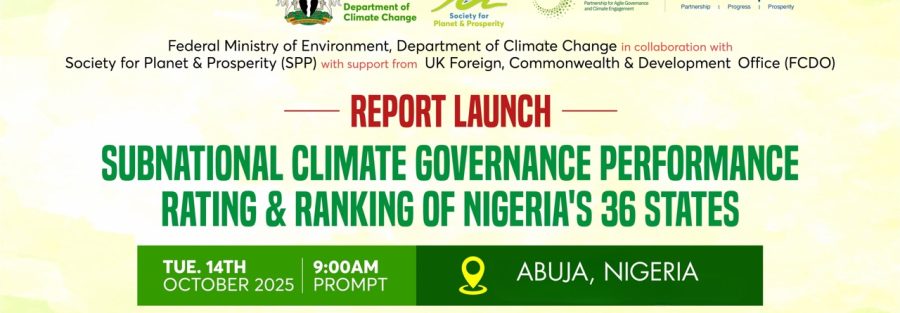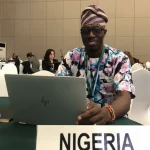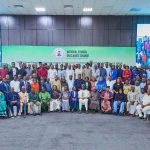October 14, 2025 has been fixed as the date for the release of the second subnational climate governance performance ranking of the thirty-six states in Nigeria. This was announced by the Society for Planet and Prosperity (SPP)—the organisation leading the process—and the Department of Climate Change (DCC), Federal Ministry of Environment, Abuja, Nigeria.
Preparatory to the launch, SPP and DCC, on September 29, 2025, met for the final time with the Subnational Governance Performance Ranking Expert Review Panel to finalise the results.
Building on the success of the maiden edition, the second edition introduces several improvements, including the establishment of a Review and Quality Assurance Panel composed of distinguished national and international climate governance experts, to ensure better accountability and transparency.
The panel was inaugurated in July this year, with the mandate of upholding the integrity and quality of the ranking process and report.
In his welcome address, Prof. Chukwumerije Okereke, SPP President, thanked the panellists for volunteering their time and expertise to improve and strengthen the ranking process, and expressed great delight at the progress made so far. “I am pleased with the progress the ranking has made in strengthening subnational climate action. We received extensive feedback from the first edition, and that response, along with the strong cooperation of state governments, demonstrates the growing political will to improve. I am confident this initiative will continue to elevate the standard of climate governance at the state level,” he said.
Members of the panel lauded SPP and the Federal Ministry of Environment for the initiative, which they said will drive genuine climate initiatives in the subnational in a more practical way.
They individually provided feedback on how to improve the process, and collectively called for greater emphasis to be placed on weighting implementation more heavily in future rankings.
Professor Chinedum Nwajiuba, Chairman of the Review Panel, highlighted the need for more efforts in the verification process and emphasized the importance of practical projects aligned with the Paris Agreement goals above just any other projects: “This is the most beautiful thing that has happened to climate change efforts in a long while. It is a shift from roundtable gatherings to practical implementation, and I must commend the Federal Ministry of Environment and the Society for Planet and Prosperity for making great efforts to hold this ranking for the second time. Often, we find that great initiatives such as this are not sustained beyond the first editions and therefore lose momentum,” he said.
Dr. Mrs Priscilia Achakpa, Global President of the Women Environment Programme (WEP), and Mrs. Gbemisola Akosa, Executive Director Centre For 21st Century Issues (C21st) called for the recognition of states that prioritize gender and climate change, suggesting that an honourable mention for such states should be considered.
They commended efforts to integrate their calls for gender mainstreaming in the process, while stating that efforts must be made to measure gender action beyond just capturing them in policy documents.
Mr. Olumide Idowu, Executive Director, International Climate Change Development Initiative, called for a push for the subnational to recognise the voices of the youth in climate policy. According to him, youths have innovative ideas and are those who must bear the brunt of climate impacts in the future. Therefore, the subnational must show how they integrate youths in climate action in a practical way.
This year’s ranking process was initiated on June 24, 2025, with a virtual workshop that brought together climate change desk officers, directors, permanent secretaries, and focal persons from across the states to showcase the updated methodology and project timeline.
The report (also known as the Climate Governance Scorecard) which evaluated all 36 states across five thematic areas: Climate Institutions and Governance, Climate Policy and Action Plan, Climate Project Implementation, Climate Budget and Finance, and Online Visibility, placed Lagos, Gombe, and Ebonyi as the top three performers, while Borno and Ekiti states shared the 4th position in the first edition launched in 2024.
The Climate Governance Scorecard, received funding from the European Climate Foundation (ECF) for the maiden edition and is now supported by the UK Foreign, Commonwealth and Development Office (FCDO) under its Partnership for Agile Governance and Climate Engagement (PACE) program in Nigeria, to enhance climate governance performance at the subnational level by encouraging healthy competition among subnational actors.
The ranking highlights the growing importance of subnational governments in driving global climate action, as recognised in the Paris Agreement.
The high-level launch event in Abuja will be attended by distinguished leaders, including the Honourable Minister for Environment, members of the Federal Executive Council (FEC), state governors, state commissioners, NGOs, and international development partners.
The expert review panel is composed of Prof. Chinedu Nwajiuba, Chair of the Board, West African Science Service Centre on Climate Change and Adapted Land Use (WASCAL); Prof. Olukayode Oladipo, Adjunct Professor, UNILAG; Prof. Daniel Gwary, University of Maiduguri; Dr.Eugene Itua, CEO, Natural Ecocapital; Mrs Halima Bawa, Director, National Council Climate Change Secretariat; Dr. Pricilia Achakpa, Global President of the Women Environment Programme (WEP); Mr. Olumide Idowu, Executive Director, International Climate Change Development Initiative; Mr. Amara Nwankpa, Director General (Acting) Shehu Musa Yar’Adua Foundation; Mr. Eghose Omoigui and Madam Gbemisola Akosa, Executive Director Centre For 21st Century Issues (C21st).
It is expected that the report will inspire collaborative action among subnational actors, attract private sector and international organisation partnerships for technical support and capacity building, thereby boosting climate actions in the respective states.
Ugochukwu Uzuegbu,
Communication Specialist, SPP






